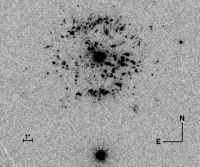 Hubble Space Telescope images of the ejecta surrounding the nova T Pyxidis resolve the emission into more than two thousand bright knots. We simulate the dynamical evolution of the ejecta from T Pyxidis during its multiple eruptions over the last 150 years using the adaptive mesh refinement capability of the gas dynamics code Ramses. We demonstrate that the observed knots are the result of Richtmeyer-Meshkov gas dynamical instabilities (the equivalent of Rayleigh-Taylor instabilities in an accelerated medium). These instabilities are caused by the overrunning of the ejecta from the classical nova of 1866 by fast moving ejecta from the subsequent six recurrent nova outbursts. The model correctly predicts the observed expansion and dimming of the T Pyx ejecta as well as the knotty morphology. The model also predicts that deeper, high resolution imagery will show filamentary structure connecting the knots. We show reprocessed Hubble Space Telescope imagery that shows the first hints of such structure.
Hubble Space Telescope images of the ejecta surrounding the nova T Pyxidis resolve the emission into more than two thousand bright knots. We simulate the dynamical evolution of the ejecta from T Pyxidis during its multiple eruptions over the last 150 years using the adaptive mesh refinement capability of the gas dynamics code Ramses. We demonstrate that the observed knots are the result of Richtmeyer-Meshkov gas dynamical instabilities (the equivalent of Rayleigh-Taylor instabilities in an accelerated medium). These instabilities are caused by the overrunning of the ejecta from the classical nova of 1866 by fast moving ejecta from the subsequent six recurrent nova outbursts. The model correctly predicts the observed expansion and dimming of the T Pyx ejecta as well as the knotty morphology. The model also predicts that deeper, high resolution imagery will show filamentary structure connecting the knots. We show reprocessed Hubble Space Telescope imagery that shows the first hints of such structure.
Authors: Jayashree Toraskr, Mordecai-Mark Mac Low, Michael M. Shara, David R. Zurek

